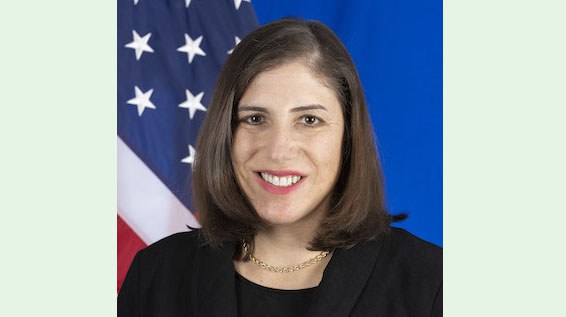Senate vets Biden’s pick for key human rights diplomat
Share

Dafna H. Rand was the Director of the Office of Foreign Assistance at the Department of State from 2021-2023.
Amid a backlog of Senate confirmation hearings, the U.S. State Department’s Bureau of Democracy, Human Rights and Labor has not had a confirmed leader since President Joe Biden took office with a pledge to put human rights at the center of his foreign policy.
That appears imminently set to change, with Dafna Hochman Rand – Biden’s nominee for assistant secretary of state in charge of the bureau – breezing through a joint confirmation hearing on Thursday.
A skeleton crew in the Senate Foreign Relations Committee met seemingly as a formality, with Chairman Sen. Ben Cardin noting the absence of Republicans, who were meeting to discuss the carving up of a bill that had included funding for the U.S. southern border.
“There is a lot going on today,” said Cardin, who is a Democrat from Maryland. “You may have read about some of that in the paper.”
But Cardin said their absence, in a way, showed their faith in the quality of the nominees before the committee, with Rand joined by two other White House nominees, including for ambassador to Timor-Leste.
“We do have a scheduled vote for a little later and say afternoon, and there’s negotiations going on,” he said. “That’s the reason why you might not see the type of normal participation at this hearing – it’s a reflection, I think, of the positive quality of our nominees.”
Now a resident fellow at Georgetown University, Rand previously served as the assistant secretary of state for democracy, human rights and labor during the Obama administration, and until last year was director of the State Department’s Office of Foreign Assistance.
Rand faced no critical questions during her hearing on Thursday, with only Sen. Jim Risch, a Republican from Idaho who serves as his party’s ranking member on the committee, ducking into the hearing at its opening to offer brief thoughts on her nomination.
Risch said he hoped Rand would use the bureau’s millions of dollars in foreign assistance to help legitimate rights defenders around the world “and not the agenda of the left.” He then excused himself and left.
Unfilled position
The Senate is currently working through an extensive backlog of nominees from the White House, with the average number of days it takes to confirm a single person having grown from about 80 days under President George W. Bush to about 145 today under Biden.
The unusual backlog has even led to a push to allow the Senate to confirm up to 10 appointees from each committee in a single vote, in order to cut down on the delays caused by procedural business.
In the meantime, the position of assistant secretary of state for democracy, human rights and labor has been filled by an acting official who does not need to be confirmed by the Senate.
Cardin said it was a position that is particularly important to fill as the assistant secretary represents “our voice in regards to our values” in the State Department, calling the delays “unacceptable.”
“Whether it’s your generals from Myanmar or the Kremlin in Moscow, repression is on the rise,” Cardin said, adding that “attacks against human rights defenders are up across the globe and coups and democratic backsliding threaten progress on every continent.”
During her testimony, Rand said that her top two priorities, if confirmed, would be to focus on “how we respond to the PRC,” referring to the People’s Republic of China, and Russia’s threats to human rights.
“The U.S. is not only competing with the PRC in the military and economic domains – these are critical to U.S. national security and prosperity – but this is also a contest about the fate of the rules based international order,” Rand said. “The PRC’s vision suppresses freedom of expression and persecutes ethnic and religious minorities.”
She also pledged to advocate for a more “consistent” U.S. foreign policy when it comes to defending human rights, even as she said there were times when other foreign policy interests interceded.
Rand said she hoped to “make sure those times are few and far between” and said there were “careful and creative” ways to integrate human rights into U.S. foreign policy decisions that “improves our power, our standing, our influence and our leverage.”
After less than an hour, Cardin called on Rand and her two fellow nominees to respond to any written questions submitted by senators not present as soon as possible to expedite their confirmation.







